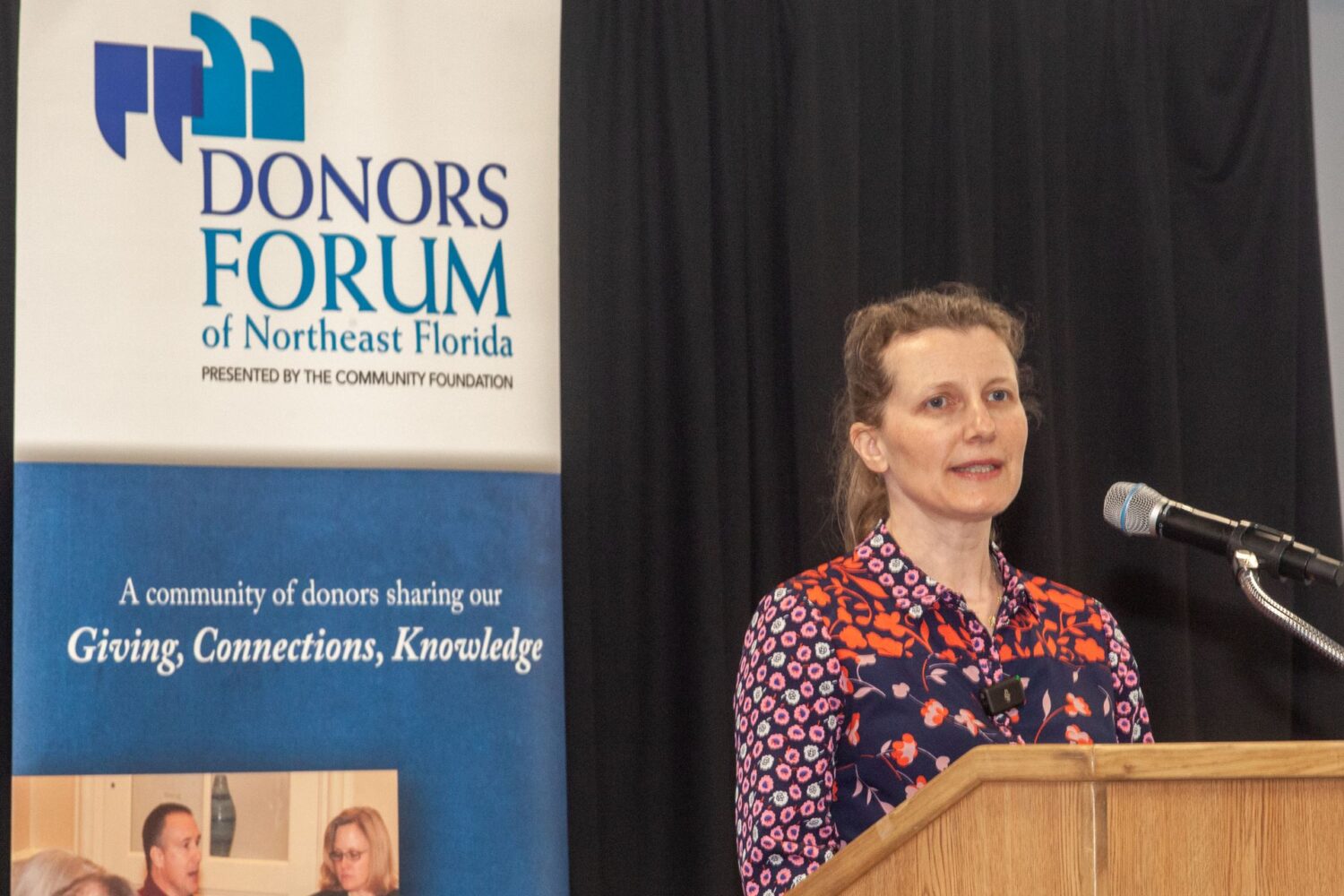On March 29, 2023, The Community Foundation for Northeast Florida hosted a Donors Forum with the topic Living Healthy, Wealthy, and Wise. The program featured Coventry (Covie) Edwards-Pitt, Partner and Chief Creative Officer of financial advisory firm Ballentine Partners, headquartered in the Boston area. Covie has led the firm’s 10-year research effort into best practices around the impact of wealth, and she has authored the Healthy, Wealthy, & Wise collection – which includes Raised Healthy, Wealthy, & Wise, Aged Healthy, Wealthy & Wise, and her recently released book Engaged Healthy, Wealthy & Wise. Covie was with us for a Donors Forum in 2017, and we were so pleased to have her back to share an overview of her books, particularly her newest one, and insights from her research.
Highlights from Covie Edwards-Pitt
- In our line of work, our relationships with clients are about much more than money. They involve family relationships and what brings meaning to each individual. People come to us with practical questions, but the answers usually revolve around the best way to approach what matters in their lives.
- For Raised, Healthy, Wealthy & Wise, I interviewed children who have been raised amid influence and stayed grounded. A summary of the lessons from the book include:
- Parents’ first instincts are often to make a child happy; but helping keep kids grounded involves daily creativity and intentionality. And often not giving in to those first instincts.
- All people who might inherit need to go through a phase where they realize they don’t need the money to get where they want to be in life; that if the money went away, they would be okay.
- Aged, Healthy, Wealthy & Wise explored how to age vibrantly. Interviews with vibrant elders produced lessons such as:
- Continuing to learn as you age is vitally important. It can be hard for people to go through the time when they are bad at something, which is necessary in order to learn new things. Push through the embarrassment, and it will be worth it.
- Engaging with others is vital and continuing to form relationships, especially with people who are different from you.
- Maintaining drive and purpose is crucial for overall health and wellbeing. Ask yourself, “If this were my last day on Earth, what would I regret not having had the chance to do?”
- For Engaged Healthy, Wealthy & Wise, I conducted 50 interviews with 22 couples between the ages of 30-70 – all who were in their first marriages – primarily composed of an inheritor and a non-inheritor. I guaranteed anonymity, and it was an interesting and humbling experience. My research had eye-opening implications for how we should approach wealth transfer. I heard things I’d never heard before, and it has changed how I function as an advisor.
- Parents of inheritors need to make sure that their children have space in their 20s/30s to go off and figure out who they are outside of the family – this is the individuation process, and it is vital for healthy and grounded development.
- Young inheritors may have a sense of shame about their unearned advantage or live in the shadows of very successful parents. It is important that they are allowed to do for/support themselves in order to gain the confidence that they can.
- Convey to inheritors: “Whether or not you get wealth, you need to figure out how to be a competent person on your own.” Wait to involve them in family issues until after they have developed their own independence. And help them understand that having money has nothing to do with their work. Work is for them, and they need to figure out what for them is meaningful and important.
- Parents can be transparent so that the “not helping” does not seem punitive. “I could do this for you, but I’m not and here’s why.”
- Parents also need to be very intentional about what values they are going to instill in their children, and they need to reinforce the values as they get older. Sometimes, it takes sacrifice to help the child have a broader concept of “normal.”
- When couples get engaged, their partner may be one of the first people who sees them as their best self, as the adult they are becoming. They often change, and parents should realize that these changes are not necessarily because of the partner – but because they feel empowered to be themselves. The partner is actually a gift, not a threat.
- It is important to make the non-inheritor part of the couple feel truly included in the family. There is a difference between inclusion and tolerance, and I devoted a whole section on the book to a discussion on this.
- Following this research, our firm rarely recommends prenuptial agreements anymore. Introducing a prenup can disrupt such things as agency, loyalty, unity, and equality in a relationship.
- For parents of an inheritor/non-inheritor couple, it is important to recognize the need for autonomy. Make your wealth management plans as flexible as possible and allow for variation between your children’s various nuclear families. Also, be sure to seek your children’s counsel on any planning that involves their children (your grandchildren).
- It is often when couples have children that they begin to reassess their wealth management strategies. Financial advising, which is often in the larger family’s interest for an inheritor, needs to be reinvented so it is about them, not their parents. Again, having autonomy is important.
- My advice for parents is to step back and look at the big picture, broaden your definition of risk, and reflect on your own motivation. Be sure to give your children agency so they can make their own decisions and take their own risks.
Covie shared more in response to attendee questions
- Jobs when children are in high school or college can be very useful. They learn how to impress an authority figure other than a teacher or mom and dad. And getting that first paycheck can be very important for understanding the value of work. Also, many lessons can be learned from working with all types of people, including those who are making a living on minimum wage.
- Raising grounded kids and helping them become independent often means parents have to “live with less.” Examples are not getting your child that car or gadget that they want, sacrificing a family vacation so your child can hold down a summer job, or letting your child plan the family vacation with a certain budget so they can learn the value of things.
- Don’t panic if your young adults in their 20s are not interested in the family’s philanthropy. This is a common evolution, and they must get through the maturation phase before they will realize the value. They also often feel most invested when they give away money of their own that they have earned.
- If there is a family business that a child is potentially joining, you have to allow room for reinvention. Sometimes, there may be pushback on structures if things have always been done a certain way – and certainly, the best practices of governing need to be considered. The practice of “pruning” can be important – be sure you are bringing in those who DO want to come into the business.
The next Donor Forum will be held on May 11 at the River Club, with the topic of Mental Health.
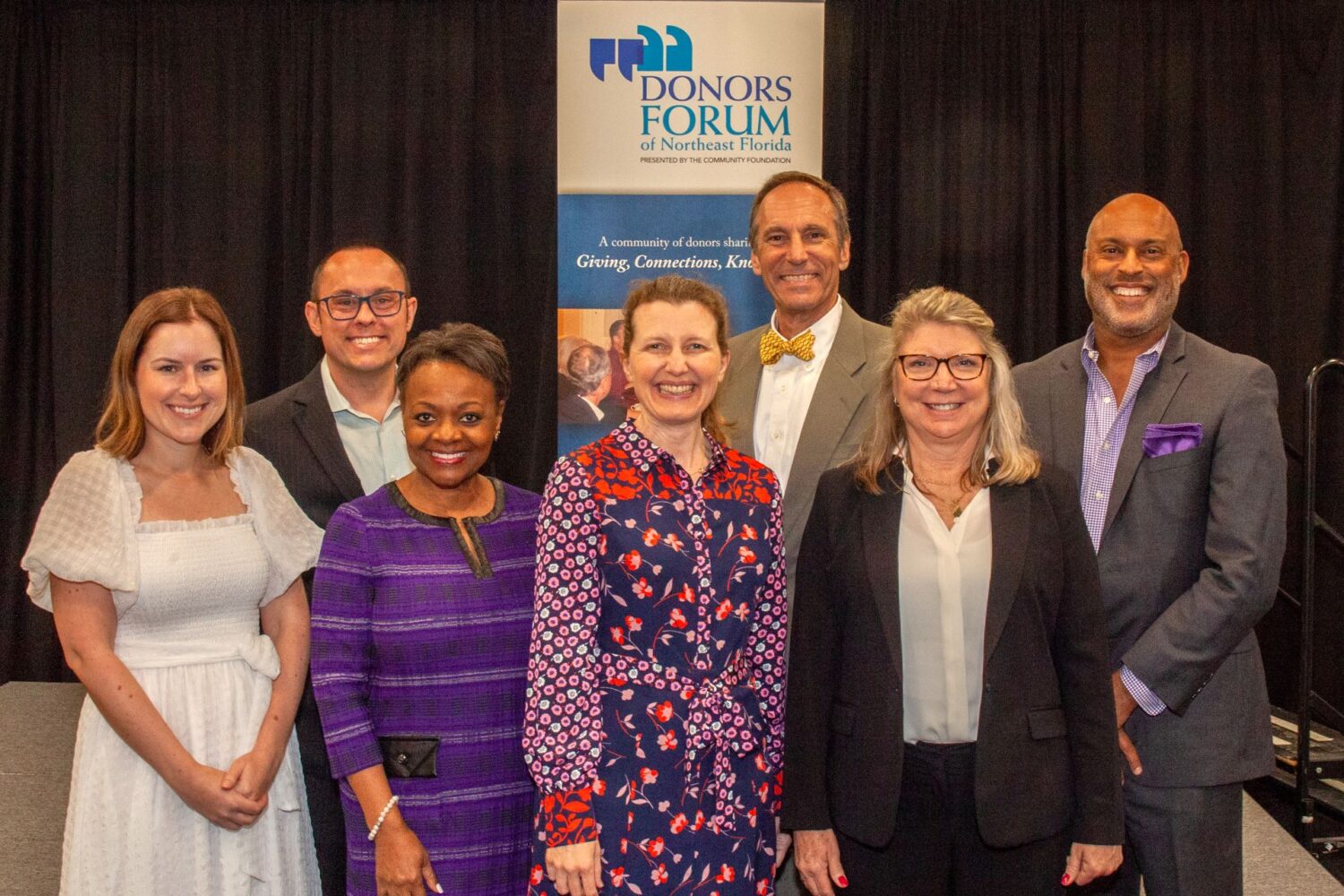
Explore More Topics from Donors Forum
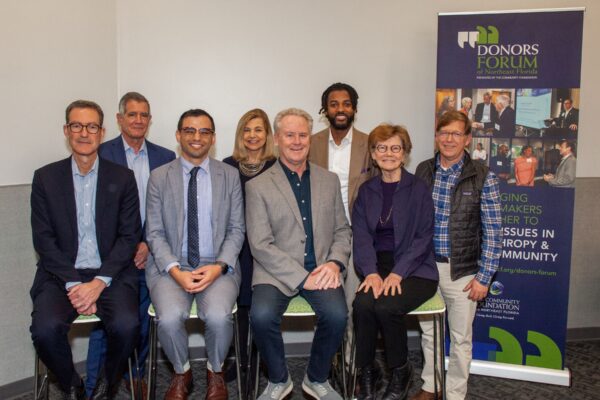
Recap: The Philanthropic Case for Local Journalism
Our Donors Forum in November explored how philanthropy is embracing the nonprofit news model in response to shrinking profitability of newspapers.
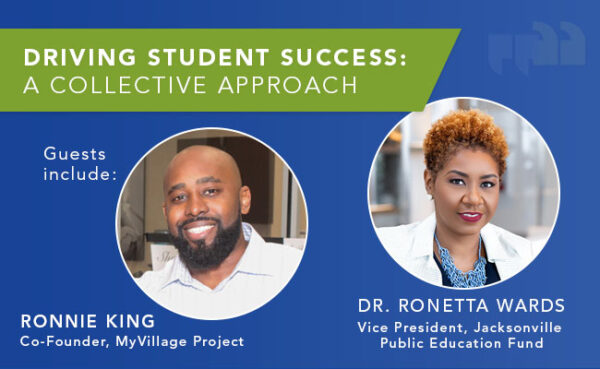
Donors Forum: A Collective Approach to Student Success
Our September Donors Forum focused on the nationwide challenge of student absence at school, and how community organizations are stepping up to help.
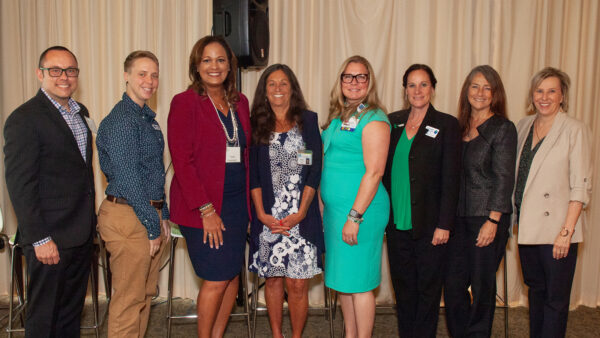
Responding to the Mental Health Crisis in Duval County
The Community Foundation for Northeast Florida hosted a Donors Forum, Responding to the Mental Health Crisis in Duval County
